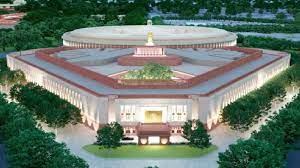The Women's Reservation Bill: A Political Game-Changer that Surprised the Opposition
Introduction:
In the complex arena of Indian politics, surprises are not uncommon, but the recent move by the Modi government to push for the Women's Reservation Bill has left the opposition stunned. The bill, which had been languishing in the corridors of power for decades, has suddenly been thrust into the spotlight, signaling a significant shift in the political landscape of India.
The Historical Context:
The Women's Reservation Bill, also known as the 108th Amendment Bill, seeks to reserve one-third of the seats in the Lok Sabha (the lower house of India's Parliament) and state legislative assemblies for women. This initiative, aimed at empowering women in politics, has been a contentious issue for years.
The Long Road to Passage:
For years, the Women's Reservation Bill had been a contentious issue, facing staunch opposition from various quarters. It was introduced in the Rajya Sabha (the upper house) in 1996 but faced consistent roadblocks and political maneuvering that prevented its passage. The bill saw several attempts at discussion and debate but always seemed to fall short of the consensus needed for approval.
The Modi Government's Surprise Move:
Prime Minister Narendra Modi's government has not shied away from bold policy decisions. Still, the sudden push for the Women's Reservation Bill caught many political pundits and opposition parties off guard. It was seen as a surprising move by a government known for its strong stance on economic reforms and national security.
Factors Behind the Surprise:
1. **Political Timing:** The Modi government's decision to table the bill comes at a time when state elections are on the horizon. This strategic timing has put the opposition on the back foot, as they now have to respond to a populist and gender-empowering move.
2. **Appealing to Women Voters:** With a keen eye on appealing to women voters, the government has demonstrated its commitment to gender equality and representation. This could be a game-changer in the upcoming elections, especially in states where the gender gap in politics is particularly wide.
3. **International Pressure:** India has faced international scrutiny regarding gender equality, and this move aligns with global calls for increased women's participation in political processes.
4. **Building a Legacy:** Prime Minister Modi, with an eye on his political legacy, seems to be leveraging this opportunity to be remembered as a leader who championed women's rights.
The Opposition's Dilemma:
The surprise move by the Modi government has left the opposition in a dilemma. While they may support the concept of women's reservation in theory, the timing and manner in which the bill has been introduced have made it challenging for them to oppose it without alienating a significant portion of the electorate.
Conclusion:
The Women's Reservation Bill, long considered a distant dream, has suddenly become a reality under the Modi government. The surprise element in its introduction has not only left the opposition scrambling for a response but has also rekindled hope for increased gender equality in Indian politics. As the bill progresses through the legislative process, it will be fascinating to observe the political dynamics at play and the broader impact it may have on India's political landscape. One thing is clear: the Modi government has once again demonstrated its ability to take bold and unexpected steps in pursuit of its policy goals.


No comments:
Post a Comment